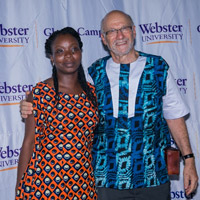Ghana Hosts Public Lecture on African Leadership, Development
March 07, 2017

While many African economies have been showing significant growth rates, for much of Africa there has been no commensurate improvement in the living standards and quality of life.
In what ways have African leaders, since independence, contributed to either perpetuating and/or solving challenges facing the African continent? This and other related questions were addressed during the latest public lecture organized by Webster University's campus in Accra, Ghana.
The sixth in a lecture series over the past year and half, this event's theme was "African Leadership and Development: 21st Century Challenges."
Speakers included the head of the International Relations Department at Webster Ghana, Leonard Suransky, and Akosua Darkwah, an expert in gender, globalization and economic policies. Attendees came to Webster from academe, corporate institutions, and security agencies in Ghana.
In his remarks, Suransky urged Africans to have a democratic hold on their leaders since this is the only way leaders can be held accountable. He further called for stronger constitutional measures, a stronger civic societal outlook, and a more vibrant media to ensure a more responsible leadership in Africa.
Resurgent Movements in Africa
Meanwhile in her remarks, Darkwah noted there has been a resurgence of people who are protesting and demanding for more accountable leadership. She cited the #FeesMustFall movement in South Africa; the OccupyGhana Movement; and the rising demand for change amongst citizens of the Democratic Republic of the Congo.
This, she posited, is a good start for making African leaders accountable.
Darkwah also urged young Africans to stop being followers and start taking leadership roles if they want to see change on the continent.
